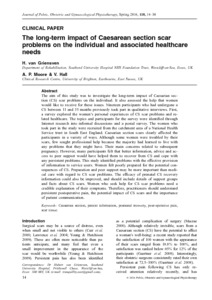van Griensven, H; Moore, A; Hall, V
(2016)
The long term impact of caesarean section scar problems on the individual and associated healthcare needs.
Journal of Pelvic, Obstetric and Gynaecological Physiotherapy, 118.
pp. 14-30.
ISSN 1367-7845
SGUL Authors: Van Griensven, Hubertus Joannes Maria
![[img]](https://openaccess.sgul.ac.uk/115351/1.hassmallThumbnailVersion/Impact%20CS%20scar%20van%20Griensven%202016.pdf)  Preview |
|
PDF
Published Version
Available under License ["licenses_description_publisher" not defined].
Download (2MB)
| Preview
|
Abstract
The aim of this study was to investigate the long-termimpact of Caesarian section(CS) scar problems on the individual. It also assessed the help that womenwould like to receive for these issues. Nineteen participants who had undergone aCS between 11 and 35 months previously took part in qualitative interviews. First,a survey explored the women’s personal experiences of CS scar problems and relatedhealthcare. The topics and participants for the survey were identified throughInternet research into informal discussions and a postal survey. The women whotook part in the study were recruited from the catchment area of a National HealthService trust in South East England. Caesarian section scars clearly affected theparticipants in a variety of ways. Although some women were troubled by theirscars, few sought professional help because the majority had learned to live withany problems that they might have. Their main concerns related to subsequentpregnancy. However, many participants felt that better information, advice and access to peer support would have helped them to recover from CS and cope with any persistent problems. This study identified problems with the effective provision of information to service users. Women felt poorly prepared for the potential consequences of CS. Preparation and peer support may be more important than medical care with regard to CS scar problems. The efficacy of prenatal CS recovery information could also be improved, and should include details of support groups and facts about CS scars. Women who seek help for CS scar problems need a credible explanation of their symptoms. Therefore, practitioners should understandpersistent postoperative pain, the potential impact of CS scars and the importanceof patient communication.
Statistics
Item downloaded times since 05 Jun 2023.
Actions (login required)
 |
Edit Item |


